Shalom Delhi Project
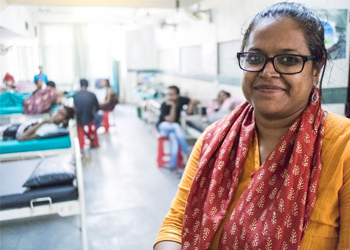
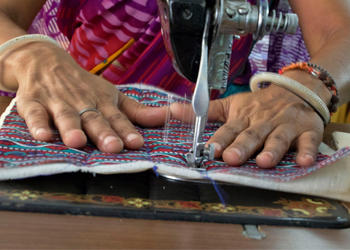
The Shalom Delhi Project is the largest of EHA’s projects. Begun in 2001, Shalom was the pioneering work in HIV/AIDS care in Delhi. Unbelievably, today Shalom is the only HIV care center in this city of almost 19 million people. It is estimated that at least 55,000 people in Delhi and 2.5 million across the country are living with AIDS.
The word Shalom means peace, but it also means quietness, wholeness, and wellness. Under the leadership of Dr. Rajni Herman, the staff at Shalom seek to care for the medical, emotional, spiritual, and social needs of people infected with or affected by HIV/AIDS. They have a small facility with just 10 beds, but they run a vast program of home-based care with very few staff. Many of the people they care for are widows and their children as well as transgender individuals (men who identify as women) who often work in the commercial sex trade. Many times, wives get HIV from their husbands and then unknowingly pass it along to their children. When these husbands die from the disease, their widows are left to support the family while struggling with the illness themselves. They are a very fragile, vulnerable, and marginalized group of people.
Medical care for patients with HIV/AIDS (as well as life-limiting diseases like cancer) is just one of the services that Shalom offers. They run literacy courses for the women and life skills programs for the adolescents. They train young people in leadership and educator skills, and help them to access higher education programs such as a nursing degree. Since few of the widows have work experience or much education, Shalom staff opened the Kiran Project, where they teach the women to sew and then market and sell the sewn products. The staff become deeply involved in the families’ lives and help them in countless ways.
It is amazing how Shalom’s tiny staff of 20 impact so many people so deeply. Many times, Shalom is the only place they feel seen and heard. We hope this newsletter has touched your heart and helped you learn more about this people group in India.
Breaking the Cycle of Poverty
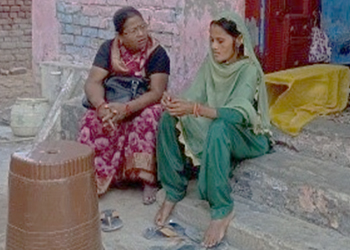
Nazma grew up in a large Muslim family that was filled with poverty, neglect, and food insecurity. She longed to play with other children, but out of necessity was forced to work as a child with her family, making goods for a local factory in order to put food on the table. Nazma felt lonely, suffocated, and completely helpless, and she thought marriage would be her ticket to happiness.
When she married at 15, she found out she was the second wife, and that she had no standing within the family. Her husband left her with his parents and first wife to go work in Delhi. Nazma was emotionally and physically abused, and she was forced to do all the household work and field work and to sleep out on the veranda in all weather.
When she had a baby, her in-laws often pressed her to kill herself along with her daughter. Her husband finally brought the family to Delhi when Nazma was pregnant with their third daughter. But during a prenatal checkup in her fourth pregnancy, Nazma was diagnosed with HIV. She was completely broken. Her husband tested positive too, but thankfully their children all tested HIV negative.
Her husband barely supported the family financially. It broke Nazma’s heart that her kids’ childhood was filled with making factory goods just as her childhood had been. She hated living in the same cycle of poverty.
Then the staff at a government hospital saw that Nazma needed medical care and more. They sent her to enroll in the Shalom Project. Nazma says, “After I met the Shalom team, for the first time in my life I felt valued, loved, and cared for. My eldest daughter, Nafisa, will soon be enrolled in Shalom and the Invisible Girl Project, which will give her a fighting chance at making her dreams of becoming a nurse a reality. This has given me a glimmer of hope that was missing in my life. I am confident that the cycle of poverty and oppression will soon be broken in my family, and for this I am truly grateful to the Shalom team.” The Shalom team looks forward to walking alongside Nazma and investing in her life and the lives of her children in the ways that are most helpful to them.
Living with Leukemia
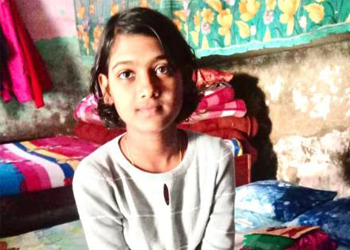
Nisha lives in a rented house in Delhi with her parents and older sister. Currently in 9th grade, Nisha is just 15 years old, yet she is already aware of how unpredictable and short life can be. She tries to enjoy every moment of it.
When Nisha was 12, she suffered from a persistent high fever, severe body aches, and swelling in the lymph nodes in her neck. She was referred to a government hospital, and a bone marrow biopsy was performed. Nisha was diagnosed with leukemia, and she went through 8 months of chemotherapy. Her family was devastated watching Nisha struggle. EHA’s Shalom Delhi Project staff found out about Nisha’s illness, and they offered palliative care as well as entrance into their life-skills and leadership classes for adolescents.
After chemotherapy, Nisha was symptom free, and her family was ecstatic. But since her father frequently had taken time off to accompany her to the treatments, he lost his job. Shalom stepped in and provided monthly food hampers because the family could not afford enough food for even two meals a day.
Nisha’s zeal for her studies led her to enroll in an additional program at Shalom called the Invisible Girl Project (IGP), which provides financial assistance for educational fees. Recently, her family noticed new swelling on her neck and Nisha complained about a sore throat. She is being evaluated and her family is anxious about the results. Despite the potential setback Nisha is facing, she is enjoying life and concentrating on her studies, especially after receiving support from IGP.
The Shalom team will continue walking alongside this family, whatever they may face. It is supporters like you who make the Invisible Girl Project possible and open doors for girls like Nisha.
On the Path to Becoming a Doctor
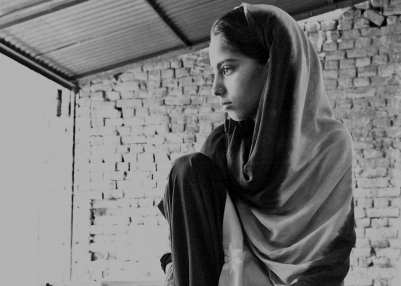
Despite living in a family that is constantly plagued by HIV, 14-year-old Ritu has chosen action over sorrow. After losing her father to HIV and seeing her younger brother and mother living with the illness, Ritu decided that she would be the one who would bring about a change. “I want to fulfill my mother’s desire by becoming a doctor so that I can help needy people who cannot afford treatment.” Despite being HIV-positive herself, Ritu will stop at nothing to achieve her goal.
Outside of academics, Ritu leads a very full life. She has a passion for sports, especially volleyball, and she enjoys participating in school sports competitions. Ritu is a firm believer in the power and influence that women can have in the world. She plans on continuing her quest for education, knowledge, and helping those in need until her voice is properly heard.
Despite her best efforts, good education is costly and she needed financial support in order to achieve what is deeply ingrained in her heart. She and her brother are part of the adolescent program at Shalom, which is where Ritu’s deep love for education and her eagerness to be a doctor first came to light.
Ritu’s mother, Geeta, is currently unemployed, and they live at the mercy of their extended family. EHA’s Shalom Delhi Project staff have been helping them with regular visits by the home-based-care team and providing them with food hampers, but enrolling Ritu in the educational assistance program has come as the greatest blessing to the family.
The Shalom team’s desire is that as they support and empower Ritu, she will continue to find her own voice and seek to transform the lives of those around her.
A Father’s Secret Life
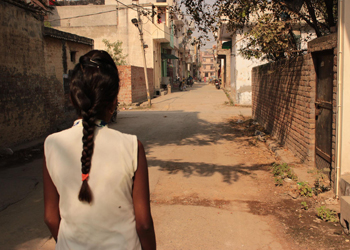
Jiera loved her father more than anything, and she waited in anticipation for him to come home each day. But often, time would pass with no sign of him. Then finally one day when he came home, he had returned to drinking and was shouting at Jiera’s mother. He no longer took pride in himself, and he stopped caring for his family.
Unbeknownst to Jiera, her father was an HIV-positive transgender man who spent the time away from home with his transgender friends. Her mother lived in fear that she and her children would become outcasts in society if her extended family found out about her husband’s secret life.
Jiera’s father was admitted to EHA’s Shalom Delhi Project’s medical ward because of his poor adherence to his antiretroviral (ART) medication for HIV. After his release, he continued to drink heavily, and the Shalom staff made regular visits to his rented room, praying for him and counseling him to take his medication.
At the same time, Jiera’s mother was thankful to be able to open up and share the deep matters of her heart with the Shalom home-based-care staff who visited her. The support she received was invaluable.
Jiera was chosen to be part of Shalom’s adolescent and educational assistance programs. At just 11 years old, she has her entire life ahead of her to pursue her goals and show love to those around her. She longs for knowledge and is discovering a passion for teaching children.
Eventually, Jiera’s father passed away, and the Shalom team continue to care for this family, walking with them through their deep pain. Both the emotional support the staff provides as well as the practical help with educational costs mean the world to Jiera and her mother.
Providing Food for Bodies and Hope for Souls
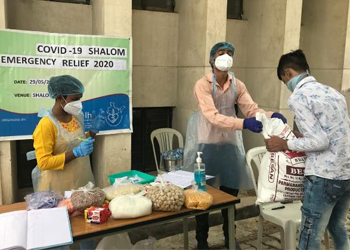
COVID-19 has brought tremendous change into the lives of the Shalom Delhi team and the individuals they work with. Daily they hear from these people—most have lost their daily income, there’s no money to pay rent, their savings have been used up, and all of this coupled with their illnesses has brought deep-seated fear and anxiety. It has been a time for Shalom staff to listen, to help these people feel that they belong at Shalom, and to bring the hope of God to these hurting people. In late May, they began providing food hampers, hygiene kits, and financial assistance to the neediest among them. Read on for the story of one family.
Manohar and Geeta are a hard-working couple; Manohar works at a shoe factory and his wife is a daily wage earner. Both of them have HIV and have been on Antiretroviral (ART) therapy for six years. They have been cared for by Shalom staff for four years. Their children, Sneha and Sunil, are part of Shalom’s adolescent program and have proved themselves to be responsible in everything entrusted to them.
When India’s nationwide lockdown went into effect, the shoe factory closed and the family lost what little income they had coming in. The small monthly pension they had received as part of a nutrition plan for HIV patients was delayed. Necessities such as food became a scarcity. Their days were filled with standing outside government schools, hoping to receive a food distribution. Paying rent became impossible.
It was at this time that Shalom decided to do emergency relief work. Manohar’s name was one of many that made its way onto the list of families to receive help. A food hamper, dry food rations, a hygiene kit, and financial help alleviated the dire situation the family was in.
Someone once said, “A handful of dough…a heart full of hope.” Shalom provided food for their bodies, but hope radiated from their eyes, and a smile was visible despite their face masks. Shalom would like to thank those who donated generously to make their food distribution possible.
Shalom Delhi Project in Need of Required Infrastructure Improvements and Additional Staff
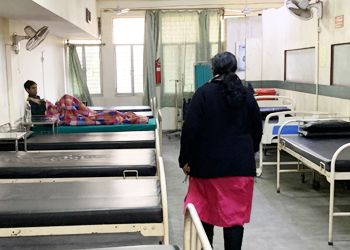
Many hospitals in Delhi want nothing to do with HIV/AIDS patients. The doctors literally won’t touch them, and often post signs saying, “Universal Precaution – HIV” by their hospital beds.
EHA’s Shalom Delhi Project is different. They welcome those infected with HIV/AIDS, patients with tuberculosis, those with terminal cancer, drug users, commercial sex workers, and transgenders. They treat each patient with dignity and love.
But they are struggling under the new rules and regulations imposed by the Indian government. They have to register under the Delhi Nursing Act, which has 40 different requirements they need to meet, including infrastructure improvements and additional staff. Somehow they have to begin paying the salary of a resident physician (who will stay overnight) and a pharmacist. They estimate the facility restructuring alone will cost $13,500.
If you feel led to help Shalom Delhi meet these requirements and continue to help this very downtrodden people group, please click the button below for donation information.
Helping the Invisible People
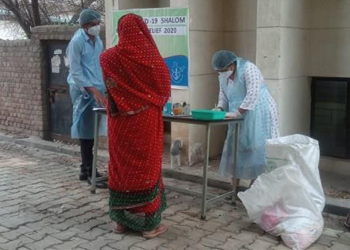
It is estimated that 90 percent of India’s population of 1.4 billion people work in “daily wage earner” jobs. These are informal positions such as maid, driver, or construction worker, and there is little continuity or job security. To the wealthy 10 percent, these people are invisible, providing services in the background to make their own lives better. These daily wage earners only eat if they work, earning between $3 and $9 each day. So when the nationwide COVID-19 lockdown went into effect, most of these people lost their only source of income and their ability to buy food.
Munira, a woman in her fifties, lives in a rented house with her three children. She is a widow who lost her husband to HIV, and she has been on ART medicine since 2010. Her 15-year-old is also HIV-positive and on treatment. A patient at Shalom, Munira has received medical care, food, and counseling for years.
As a housemaid working in three different homes, Munira was able to manage her family’s daily expenses. But during the COVID-19 crisis, Munira has not been called back to work since people are afraid to have outsiders come into their homes.
Without any income, Munira struggled to purchase basic necessities for her family, including food, medicine, and housing. Aware of Munira’s struggle, the Shalom team provided her with relief rations, including dry goods, travel expenses, and additional money. The Shalom team hopes to continue to provide food hampers to Munira and her family until they are able to get back on their feet.
Kiran Project Back in Business
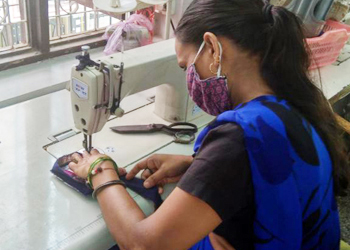
Shalom’s income generation project, the Kiran Center, was closed during April and May as it was in the containment zone within Delhi. In the first week of June, the restrictions were eased, and three of the women were able to come back to their sewing work. By July, the other four were able to return. They are strictly following the protocols of social distancing and mask wearing, but they are happy to be back at work. Thankfully, Kiran received an order for cloth masks, so the women are busy sewing masks from a wide array of colorful material.
Shalom Delhi Brings Hope… “I Want to Live!”
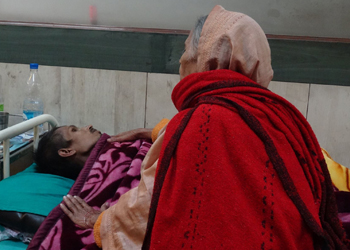
by Natalie James
2017 was a year of sickness for Ramesh. It began with regular bouts of diarrhea. By the middle of the year, Ramesh and his mother were desperate to find out what was causing it. The answer was not one anyone would like to hear—Ramesh was diagnosed with HIV infection. His CD4 count, (which usually ranges from 500 to 1500) was just 42, well below the 200 that indicates advanced HIV and prompts an AIDS diagnosis. Shortly afterward, he was diagnosed with abdominal TB, which along with the constant vomiting and diarrhea, left the 28-year-old weighing just 55 pounds.
This was not the first year marked with tragedy for Ramesh. At 12 years old he was learning to ride a scooter. A group of nearby children were playing a game by the side of the road. Resting a stick across a rock, they would strike the raised end with all their might and watch the stick spin through the air. As Ramesh rode past them, the catapulted stick struck his eye. As a result of this, Ramesh lost his sight in that eye forever.
Like the rest of his family, Ramesh never went to school. From an early age he began contributing what he could to the family’s income. One day a week, he and his brothers sold what they could— vegetables, wedding cards, or decorative items for houses. For the rest of the week he did the physically exhausting work of stripping the plastic insulation off electrical wires. From an equally early age, he also started using drugs—first those he could inhale and smoke, and later those he injected. His mother recalls the many tears she cried when he’d disappear for a week or two at a time.
Tragedy struck his life again when he was a young man of twenty. Ramesh and his brothers were out selling vegetables. Their alcoholic father, who was at home drinking on the terrace, fell and died on impact.
While Ramesh’s story is one of tragedy, it is also one of hope and determination. One night toward the end of the year, Ramesh became very sick with diarrhea. He was severely dehydrated—to the point that he had no detectable pulse and his blood pressure could not be measured—but he made the nearly three-hour journey to Shalom alone, knowing he would find someone there willing and able to help him. For most of the journey he took local public transportation, but at one point a man riding a scooter recognized he needed help and took him part of the way. In all, he changed vehicles four times.
He was in desperate need of hydration, but his veins had collapsed so much that intravenous hydration was not possible. With encouragement from the nurses, he persisted in drinking small amounts of water with ORS. Medication stopped the diarrhea and vomiting. His pulse strengthened. His blood pressure rose. Again he found his voice, “I want to live!”
The Shalom staff want him to live too. They are committed to provide compassionate care and to do whatever they can to make his life dignified and as comfortable as possible.
HIV Still a Scourge in Delhi
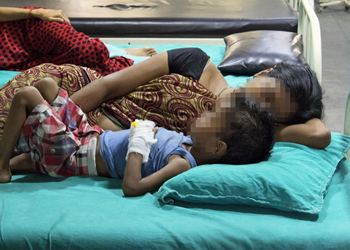
by Savita Duomai, Project Director, Shalom Delhi Project
I speak on behalf of people living with HIV. Each one has immense value and we have a responsibility to care for their needs.
At Shalom we see the need on a daily basis. We see the terrible impact that HIV has on people living in poverty. We see the pain and suffering every day—and it breaks our heart. It is this that moves our team to serve them, so that they and their families can experience healing and hope.
However, we are finding it more and more difficult to raise funds for the work we do. This is because of a general perception that HIV is no longer a problem. But that’s not true—there still are many people in Delhi with advanced HIV, and they need help. We are the only Care Home left in Delhi that provides medical services for people with HIV. It is important that this work continues so that people living with HIV in poverty can receive care with dignity and love.
I would like to challenge you to consider standing by us at this time and making a donation, even a small one, for this work to continue. We believe many donations can pool together to meet the need. Your donation can make a difference, and we urge you to do so. Donations can be made on EHA USA’s donation page or you can contact us at savita.duomai@eha-health.org.
We want to stand in solidarity with each person living with HIV. Each one is important. Each one’s life matters. Each one has much value. Would you join with us in this cause?
The Kiran Project… Threads of Hope
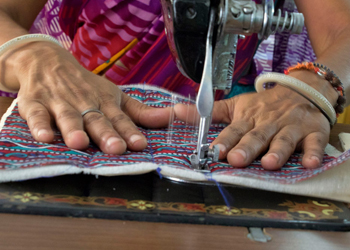
by Annaliese Petersen
EHA’s Shalom Project in Delhi serves some of the most forgotten people in India — those affected by HIV/AIDS. Often women are infected by their husbands and then left to fend for themselves. The children sometimes find themselves infected too, through no fault of their own. The wake that this disease leaves behind is overwhelming.
The newest program to come from Shalom Delhi is the Kiran Project. Kiran means “ray” in Hindi. Seeking to provide a ray of hope for widowed and abandoned mothers with HIV/AIDS, cancer, or other disabilities, the Kiran Project was started to give a means of livelihood to these women so they can provide for their families. The women sew hand-tailored bags, pouches, trivets, coasters, and crocheted handicrafts. Each handcrafted item adds a thread of hope to the lives of these artisans.
Shalom also initiated the Kiran Project to decrease the sense of shame and helplessness that accompanies life-limiting illness. In addition to employment, Kiran artisans are provided a safe place to come during the day, access to medical care and counseling, and a community of similarly-affected people. “The Kiran Project has given me hope for the future. I can now move past my fear for tomorrow,” one participant shared.
The artisans who are a part of the Kiran Project come from the lowest sectors of society. Either the artisan or someone in their immediate family is infected with HIV or cancer, thus limiting the future of the family. Through the Kiran Project, the workers have been able to provide food for their families and school fees for their children, while the community among the artisans has decreased their sense of stigma and increased their feeling of empowerment. Because of this work, their children have food to eat.
Kiran trains its workers to make textiles because this work is manageable for those faced with illness, and gives space for the artisans to allow their creativity to flourish. For those who are too weak to come to the center, primarily cancer patients and those with disabilities, the Kiran Project initiated a home-based sector, training homebound women to make crocheted products. Thus, their crocheted items are often made by their most vulnerable patients.
Feel free to visit the Kiran Project’s website to see more about what they are doing to help these women, and soon, to shop for their handmade products directly online.
Coping With Double Illnesses

by Kalei Hosaka
In India alone, there are an estimated 200,000 children living with HIV. Seema is one of them. Yet Seema not only has HIV, she also is one of the rare individuals to be diagnosed with CMV Retinitis, which causes permanent blindness. Her story is one of pain, struggle, and hope—a gifted learner trapped within the unimaginable constraints of living with HIV and irreversible blindness. At the young age of eighteen, she has suffered more than most of us do in a lifetime.
Seema’s family lives in a one-room home in a slum area of Delhi. Since the age of five, she has suffered from frequent illnesses. While she has an older brother and a younger sister, Seema is the only one who is HIV positive in her family. Sometime between sixth and eighth grade, she began to lose her eyesight, and by the time she was in tenth grade it had deteriorated considerably. Her family took her to an ophthalmologist who made a diagnosis of CMV Retinitis. He referred her for an HIV test which came back positive. Slowly the truth dawned on Seema: not only was she losing her eyesight, she was also HIV positive. “I felt so devastated about my condition. I was so sick and weak. My brother had to carry me,” Seema reflected.
In Seema’s words, the last five years have been “really terrible.” After she was diagnosed with CMV Retinitis, her teacher told her, “Drop out of school, and return when your eyesight is better.” The day that her eyesight has returned has still not come. She has not been able to study, suffered from numerous problems, often gotten upset, reduced her eating, been discriminated against for her HIV status, and has constantly worried about the future. Being blind and distant from vocational or educational pursuits, she wonders if there is a point to living. “I don’t find hope in anything at the moment. I am a burden on my family, so I feel that it’s better if I die,” she shared.
Seema sees education as a means by which she can regain her life; her goal is to finish 12th grade. She feels that at least studying through 12th grade would provide her an opportunity to maintain a decent job. In reality, an education would mean more than that: an education would build her confidence and give her hope and a reason to live.
Seema has been a part of Shalom’s Life Skills Program for young people affected by HIV. She has made friends with other HIV-positive young adults, and they reach out to her; they understand where she’s coming from. Shalom is exploring opportunities for Seema to be able to study again and fulfill her dream of completing 12th grade.
The Reality of Life With HIV/AIDS
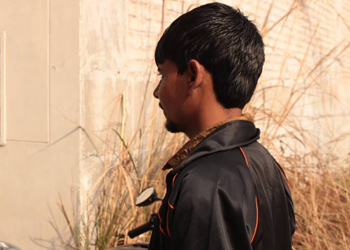
by Kalei Hosaka
The Shalom Project steps in to provide hope, medical care, medicine, livelihood training, and programs for children and adolescents, including life-skills training, character development, and group counseling. Read on for Anil’s story.
24-year-old Anil has lived the majority of his life between drug addiction and rehab facilities. From the age of nine, when he was first influenced by a group of older boys around his home in West Delhi, Anil left school and has been trapped by addiction, using and experimenting with whatever substances he was able to access through his peers: various forms of marijuana, glue, and likely heroin. Injection Drug Use (IDU) is a common pathway by which people become infected with HIV.
For the last fifteen years, Anil claims that he has been in and out of “at least six rehab centers,” one of which he was in “at least twenty times.” He first came to Shalom eleven years ago at the age of 13, soon after he was first diagnosed as HIV-positive.
Anil’s family is remarkably supportive and wants him to make a life for himself. More than ever, Anil is willing to work. “There were many times where I would run away from home, but my mother never gave up looking for me, and she’d find me and take me to rehab facilities,” he said. Even his siblings motivate and encourage him.
Anil was recently diagnosed with Tuberculosis (TB) lymphadenitis, and he was in Shalom’s facility receiving Tuberculosis treatment (CAT II)—a treatment that requires 24 daily injections. While patients often receive these injections outside of Shalom, his mother wanted him to finish all 24 injections at Shalom as she was afraid that he would not complete the treatment at home or in a rehab center.
“I very much like Shalom,” commented Anil. “Here, they provide services for all of your needs: food, drink, everything. And you can ask them questions anytime. Normally, you’d only get that kind of care in private hospitals. Yet there, the costs are so high that my family would not be able to afford them. You know they care about your interests and wishes here at Shalom.”
“I haven’t always thought I wanted to leave drugs. In between times of using, I just thought I’d die. But now, I want to quit drugs. For my family. For my mother. And for my siblings. I want to quit because I see my family’s care for me.”
When speaking with Anil, it is hard not to see the care he has for others—and his desire to live an ordinary life. Shalom plans to refer him to a good rehab center after he is discharged, and then follow up on him. Staff at Shalom are looking into ways that they can better support Anil over the next few years in coping with his life with HIV and assist him as he seeks to come out of drug addiction and begin working in a stable environment.
Dealing With HIV and Cerebral Palsy
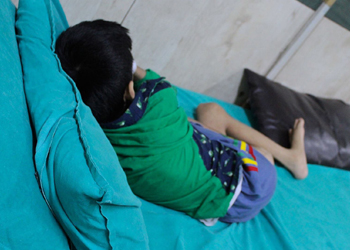
by Annaliese Petersen, EHA intern
Alone, an HIV diagnosis is a massive challenge, but paired with a disability such as cerebral palsy, it becomes almost unbearable. Yet Prince, a boy diagnosed with both CP and HIV, manages to keep a joyous smile.
Shalom first met Prince’s family six years ago, when his mother was admitted with complications from HIV. She died at home later that year. Also HIV positive, Prince’s father struggles to face each day. He was the first in the family to contract HIV, passing it on to his wife. Prince, his eldest son, was born positive. The difficulties of raising a disabled son and losing his wife drove Prince’s father into a deep depression. His family tried to help as much as they could. His siblings visited frequently, offering to help with Prince’s needs, encouraging his father to work and raise his children well. Yet the depression was too much. Prince’s father refused all assistance, worked irregularly, and did not care for the children. Prince’s younger brother was taken in by his aunt, and he now lives in the village, attends school, and engages in family life. But Prince, bound by the difficulties of cerebral palsy and HIV, is too much responsibility for any relative. So he remains at home with his father, spending his days sleeping and watching TV.
Over the years, Prince has become impressively self-sustaining. He feeds himself, and on the days when his father works, is able to pull himself to the bathroom. But he dreams of so much more. When asked by the Shalom team what his greatest desire was, Prince said he longed to be outside, to feel the sun and see the world beyond his room. But limited by his body, Prince’s world remains small and isolated.
Prince’s father refuses home visits from the Shalom palliative care team; he neglects to take his son for antiretroviral medications, and fails to take the food rations offered by Shalom. Despite innumerable conversations, attitude change seems impossible. Yet, we at Shalom cannot let go of Prince. We are hoping to find other ways to improve Prince’s quality of life. Because of his double challenge, limited by both HIV and CP, Prince cannot be taken into a hostel. So Shalom is seeking other avenues. Hopefully, Prince can be brought out of his home by volunteers and taken to Sunday school or Shalom’s adolescent program, giving him the opportunity to interact with other children and see the world outside his window. Perhaps someday Prince might access education by a home tutor. Over time, we dream of full restoration for both Prince and his father, so that they may be able to look to the future with hope and expectation.
Dr. Savita Duomai on Caring for People With AIDS
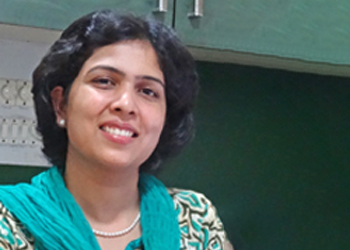
EHA has several projects that support people with HIV. The Shalom Delhi Project is one of the oldest and largest. Dr. Savita Duomai, Project Director, was interviewed on WBEZ, a public radio station in Chicago. The following is a summary of her interview.
What does the Shalom Delhi Project do?
“India is home to the third largest HIV population in the world. The numbers are overwhelming. Shalom is a center that cares for people with HIV, and we’ve been ministering for 15 years. Our goal is to improve people’s quality of life, support them, and enable them to live satisfying lives.
Most people in Delhi with HIV are desperately poor, and many are migrants from neighboring states. Once people get HIV, it complicates their situation significantly, and it quickly becomes dire. The government does provide HRT medication free of charge to treat HIV, but there is a lot more to caring for people with HIV than just giving medicine. At Shalom, we strive to provide comprehensive, holistic, quality care.”
What people groups do you reach out to?
“A lot of the families we care for are headed by widows. Being a widow is bad in India, but being a widow with HIV is devastating. Women already have less status in India, and then if they become widows they lose their inheritance and family support. They are isolated from the community, sick and less able to work, and yet they have children to care for.
We walk with these families and support them. Sometimes the children are affected as well as the mothers. We help them cope with the situation, live through it, and raise their children. We have set up a community center for women with HIV to be a part of support groups. These women work together to make products to sell to support their families. This helps them meet practical needs.
Another group we reach out to is transgenders. They are marginalized in society as much as you can be. There are about 50,000 transgenders in Delhi, and it is estimated that 25% of them have HIV. We have to reach out to them; they do not come to us. We have built relationships with them and they trust us.”
What facilities and staff do you have?
“Our health center has ten beds as well as doctors and nurses. Patients know that anytime they get sick, they can walk into Shalom and get good care. We also have a home-based program with staff who ensure patients are taking their medicine, who give emotional support, and who encourage them. We regularly visit about 100 families each month. There are also volunteers from local churches who connect to families and build relationships. We have an adolescent program to teach character and life skills. Shalom serves about 400 people each month between our center, our home-based care, and our other programs.
All of us on staff want to care for these struggling people and help them see that they have value. We communicate this care through our actions, our words, our relationships, and who we are. We offer to pray with families, and we’ve never had anyone refuse. We strive to see them through God’s eyes, see what they can become, and allow God to move through us. It’s not about us, but about God working through us to reach them. We are thankful to be a part of what God is doing.”
What do HIV patients struggle with the most?
“People with HIV need support but there is such a stigma to having HIV both from others and from within. These people have low self esteem and often believe they are cursed. We work to restore their sense of value by telling them they are made in the image of God and that He loves them. HIV is a medical illness, but the social impact of it is also important. If we want to improve their quality of life, we have to address those social issues and help them be less isolated.”
What do you want EHA supporters in the USA to know?
“People often think that the number of people with HIV is decreasing in India and it’s time to move on to other issues. While some areas are seeing lower numbers, the occurrence in North India is rising. We at Shalom face the consequences of this thinking—we see the people struggle. HIV is still causing unimaginable suffering in poverty-stricken people. If we were to move away from this situation, they would be crushed. In the future, we hope to grow our program and open more centers so that we can help more people who are struggling with HIV to be able to live their lives to the fullest God can give them.”
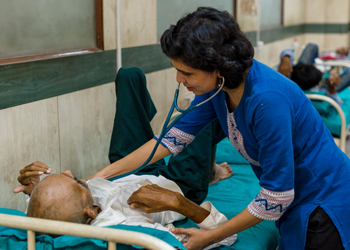
About the Shalom Delhi Project
Shalom Delhi is an HIV/AIDS project, providing care and support to people living with HIV/AIDS (PLWHAs) in and around Delhi. The project began in 2001, establishing home-based care (HBC), developing critical care services, building the capacity of non-governmental organizations (NGOs) in HIV/AIDS care, and providing counseling and medical support to widows and children infected with and affected by HIV/AIDS.
Over time, the project has begun to offer income generation activities, such as sewing, for women widowed by AIDS. Adolescent Awareness Programs were initiated to help the adolescent children of HBC families deal with the issues of the disease. Another component is the Transgender Volunteer Mobilization Program, which is designed to provide support groups for transgenders.
Through its patient-centered services, Shalom Delhi seeks to address the physical, mental, emotional, social, and spiritual needs of its clients and their families. The project has a multi-disciplinary team of staff members, providing a continuum of services through care at the hospital via the Critical Care Program, and at home through the Home-Based Care Program.
